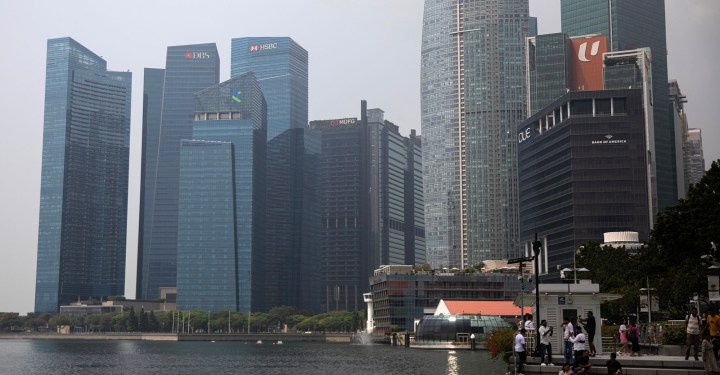GLOBAL WEALTH AND LIFESTYLE REPORT
Singapore is the most expensive city in the world for lovers of luxury

As Singapore takes first place and London tumbles out of the top 10, respondents say that preserving their health as well as their wealth is a priority.
Singapore is the most expensive city in the world for those with an appetite for luxury, according to a new report analysing what it costs to live “well” and the reactions of wealthy individuals in an environment shaken by the pandemic, a cost-of-living crisis, soaring energy costs, rampant inflation, and war in Europe.
The Global Wealth and Lifestyle Report shares the results of a survey of high-net-worth individuals (HNWIs) with bankable household assets of $1-million or more between February and March 2023. It reveals that financial stability and personal resilience are their prime motivations.
City slicker
In its city index, there are notable shifts, with Singapore – the first Asian country to reopen its borders during the pandemic – rising to first place as the most costly place in which to live well.
Factors that make Singapore expensive include high demand for accommodation, school places at a premium and a significant general cost of living. Singapore also has a high tax on cars, which is helping reduce pollution and congestion in the densely populated country. The report notes that cars are no longer viewed as a status symbol among the youth in Singapore, partly owing to the increased focus on making sustainable choices.
Ranking the world’s 25 most expensive cities by analysing the cost of a basket of goods and services representative of “living well”, including residential property, cars, business-class flights, business schools, degustation menus, wine, whisky and other luxuries, the report has found Asia to be the priciest region for HNWIs, for the fourth consecutive year. Europe, Middle East and Africa (EMEA), meanwhile, is the most affordable region, despite Dubai moving into the top 10.
Shanghai (last year’s most costly city) is in second place, followed by Hong Kong in third, with Taipei the only other Asian city to feature in the top 10 (in eighth position).
EMEA becomes for the first time the most affordable region in which to live well, owing to European cities in particular dropping down the rankings. London, which was in second place last year, has dropped to fourth. The performance of the pound sterling is a factor, but the report notes that Brexit and the ensuing turmoil are denting the UK’s reputation and causing economic complications. “Once seen as a model of good governance and stability, London now faces strong competition from burgeoning financial centres such as Dubai and Singapore.”
New York is in fifth position, Monaco sixth, Dubai seventh, São Paulo in ninth and Miami in 10th.
The Americas have overtaken EMEA as the second most expensive region in which to live well.
Cushioning for the future
In the wake of the pandemic, the world is moving again, with a significant rise in the thirst for travel, experiences, luxury goods and greater spending.
The index’s accompanying Lifestyle Survey, now in its second year, has revealed that wealth is taking on a broader meaning for HNWIs because it is no longer only about financial health.
Increasingly, wealthy individuals indicate they are taking steps to preserve their health and wealth to prepare for future disruptions, which includes investing in fitness and wellbeing, health insurance, and education, as well as family and financial resilience. However, HNWIs are also “living” again, by enjoying fine dining and travel.
Respondents noted that maintaining their and their families’ health was one of their top priorities, which included improving nutrition, taking time to recuperate and relax and raising fitness levels. More than half of respondents in all regions have used gym memberships in the past year. Personal gym equipment is high on the list of expenses.
Spending on hospitality (gourmet meals and five-star hotels) has risen in all five regions surveyed in the past 12 months, and is particularly strong in the Asia Pacific (Apac) and the Middle East regions. More than half of respondents in Apac have spent more on fine dining and hotels, while in the Middle East, 74% of respondents say they spent more on fine dining and 69% spent more on five-star hotels.
HNWIs in all regions are spending more on health insurance to secure the best healthcare, to “future-proof” their body and mind. They are also adapting their consumption and lifestyle habits – both to exploit opportunities and to brace for future shocks. Health and wellbeing have become essential to future-proofing themselves and their families, as well as shoring up their finances to face any unexpected adversity.
Building better relationships with family and friends is a high priority in all regions.
Wealth has become as much about ensuring the health and security of their families, both physical and mental, as it is about maintaining their lifestyles. Hedging against global turbulence has been a key theme in recent years, the report says, with the pandemic causing a significant shift in mindset towards preservation across nearly all demographic groups.
Increasingly, sustainability and environmental social, and governance matters were being factored into investment decisions. However, this is not necessarily evident in their own consumption patterns. Some HNWIs might be concerned with embracing future trends and aligning their investments with their personal values (in the Middle East and Asia), while these considerations are less important than capital generation for respondents in Latin America and Europe.
Cost considerations
Compared with 12 months ago, the overall price for the index of goods and services has increased on average by 13% in local currencies and by 6% in US dollars.
The report says that as recession fears mounted during the second half of 2022, the safe haven dollar rose to unexpectedly high levels, exponentially weakening other major currencies such as the euro, yen and pound sterling.
“Before 2022 the rule of thumb was that the affluent consumer had to face about double the rate of inflation of the average consumer,” said Christian Gattiker-Ericsson, head of research at Swiss wealth manager Julius Bär Group, which published the report.
“Taking 2022 as a basis (with global inflation flirting with 8%) this would have meant our index would have overshot 15% in US dollars. Considering the unexpectedly strong performance of the dollar in 2022 and the general inflationary environment, this figure was only 6%, although it did reach 13% in local currencies.”
In all regions, at least a quarter of respondents stated that they invested more money during 2022 than in the previous year, with the highest proportions in Asia and the Middle East. A significant proportion have spent more in the past 12 months, which indicates that even the wealthy are not cushioned from rising living costs, and that they are deploying recently accrued capital.
More than half of respondents from all regions – barring North America – have seen the total value of their assets increase, particularly in Asia, followed by the Middle East and Latin America.
The greatest price increases, meanwhile, were for high-demand, premium consumables such as wine and whisky, as well as luxury cars and hospitality services. Hotel suites, business class flights and fine dining all experienced significant price increases as the demand for travel and entertainment has surged.
High-end consumption is unabated, as spending has increased significantly in Asia Pacific and the Middle East, particularly on fine jewellery (62%), watches and men’s designer clothing (61%) as the desire to be in fashion while enjoying being out and about is “clearly one our respondents are indulging”. DM


















 Become an Insider
Become an Insider
Comments - Please login in order to comment.